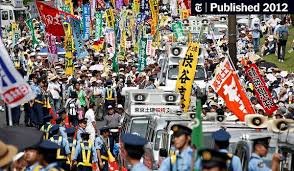Japan has officially scrapped its controversial “African Town Initiative” after weeks of mass protests in Tokyo’s Chiyoda district forced the government to abandon the plan. The program, introduced by the Japan International Cooperation Agency (JICA) in August 2025, aimed to foster partnerships between four Japanese cities and four African nations, Nigeria, Tanzania, Ghana, and Mozambique.
What was meant to be a cultural and economic exchange project quickly spiraled into political controversy after critics accused the initiative of promoting immigration. The backlash grew louder when Nigerian officials described Kisarazu, a partner city in Chiba Prefecture, as “a haven for Nigerians looking to live and work,” sparking speculation that Japan was preparing a special visa category for Africans.
Within days, local governments were flooded with angry phone calls and emails. Demonstrators gathered outside JICA’s Tokyo headquarters demanding an immediate cancellation of the project, which they saw as a veiled attempt to open Japan’s borders. Fueled by misinformation on social media, opposition reached fever pitch by late August, with far-right groups framing the initiative as a direct threat to Japan’s cultural and economic security.
Read also:
- Tinubu departs Abuja on official visit to Japan, Brazil
- Tinubu embarks on diplomatic tour to Japan, Brazil with major economic deals on table
- Another Japanese boxer dies from brain injury after Tokyo event
The African Town plan proposed linking Kisarazu with Nigeria, Nagai in Yamagata Prefecture with Tanzania, Sanjo in Niigata Prefecture with Ghana, and Imabari in Ehime Prefecture with Mozambique. JICA argued that the program would strengthen ties with Africa while breathing life into Japan’s rural communities, which are struggling with depopulation and an aging society.
But as protests spread, city after city began withdrawing from the initiative. By late September, the Foreign Ministry and JICA admitted the project had become politically untenable. In a statement to Japanese daily Asahi Shimbun, a ministry official insisted that the cancellation does not signal an end to international exchanges, promising that Japan will continue to “promote cooperation more actively” in other ways.
Despite repeated reassurances from the government that the initiative had no connection to mass immigration, the backlash proved insurmountable. Some opponents even demanded the complete dismantling of JICA, echoing calls in the United States to eliminate foreign aid bodies like USAID.
The abrupt collapse of the African Town Initiative is being seen as a setback for Japan’s diplomatic outreach to Africa, exposing how domestic politics and far-right narratives are reshaping the country’s development agenda. Analysts warn that while Japan seeks stronger ties with Africa, mistrust at home could derail future partnerships and weaken Tokyo’s long-term strategy on the continent.






